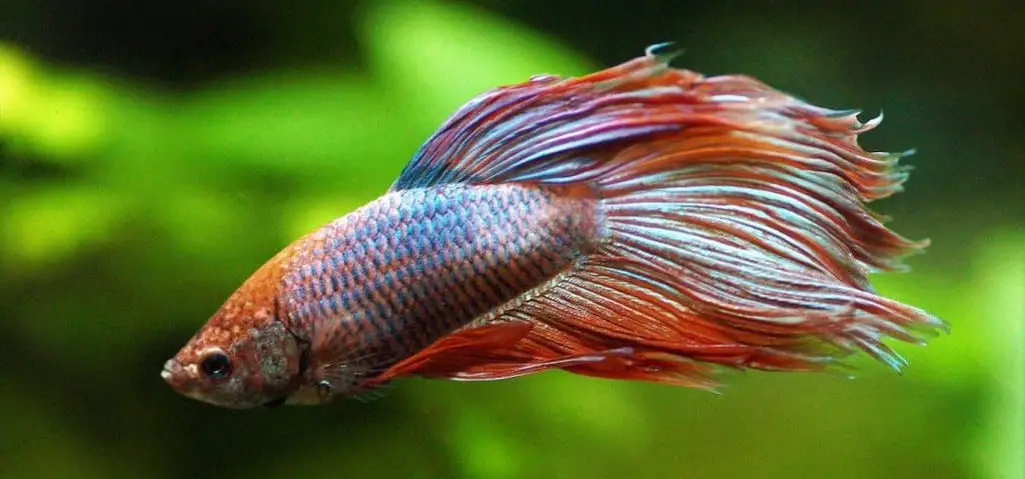Do Betta Fish Need A Filter in Their Tank?
Betta fish can bring a real element of intensity and interest to your tank. They can act as a real feature or center-point for your carefully crafted aquascape, but only if you treat them properly.
Of course, as any real devoted tank owner will know, there are a lot of different factors that you need to get right to ensure your betta can live healthily and happily for years to come. For example, you need to make sure their diet is right, so that all their nutritional needs are catered for.
You also have to make sure that the environment is sufficiently large, spacious and stimulating so that they can thrive. You also need to make sure that there are no other species present which may compete for resources with them.
But possibly more important than all other factors is the quality and clarity of the water in their tank. It is vital that your tank water is clean and free from harmful fish wastes so that your betta can thrive and survive.
With that in mind, in this article we will answer the crucial question, do betta fish need a filter?
Table of Contents
What are Betta Fish?
Before we get into the depths of this question, you should understand a bit about your betta fish and what makes it so special. First of all, you may know Betta fish by their common name of ‘Siamese fighting fish’. This popular title actually describes their behavior quite accurately.
Betta fish are notoriously aggressive and territorial. They will not hesitate to lash out at other fish and aquatic creatures if they feel even slightly threatened, stresses out, or at risk. In fact, the most poorly tempered fighting fish might attack other tank inhabitants for no reason at all.
This means that you need to choose the tank mates for your betta very carefully, to make sure they are compatible with such a fierce fighter.
There are very valid reasons why the Betta displays these violent tendencies. Originally, as their common names suggests, they were native to the shallow freshwater bodies of French Indochina, around Thailand, Cambodia and Vietnam. Here they thrived in often densely populated flooded fields or streams.
Interestingly, they do not display such aggressive behavior in the wild, except when they are mating. However, over many generations of domestic selective breeding, betta fish in captivity have been produced that are extremely aggressive. This was seen as an attractive quality for the worldwide aquarium market.
A Wide Variety of Wonderful, Vibrant Colors
As well as a very violent personality, Betta fish bring a lot of other qualities to your tank. For example, they can display a wide variety of wonderful, vibrant colors. This can range from deep, vivid oranges to beguiling blues. In the wild they are typically much duller, and they only display vibrant colors when they are provoked. They can also have a great variety of flowing fin arrangements.
They will typically grow up to a length of about 7 cm, and they can survive in a wide range of freshwater conditions. This is important to understand to answer the question, do betta fish need a filter?
What do Filters do?
Video: “10 Things You Should Know About Aquarium Filters”
To fully explore this topic, you also need to understand exactly what aquatic filters do and how this work. This should help you to rationalize the advantages and disadvantages of installing a filter in the tank with your betta fish.
First of all, fish naturally produce waste. This occurs when they digest their food, and some types of food can result in more fish waste than others.
Unfortunately for tank owners, this fish waste is actually harmful to the ecosystem, and it can become too toxic for the fish themselves if it is not dealt with or treated in some way. This is the major obstacle to keeping fish in confined locations like backyard ponds or tanks.
Fortunately, nature has provided us with a solution. There exist bacteria that thrive on the waste products (such as ammonia and nitrite) that fish produce, and they will quickly form colonies in the tank so long as they have an adequate place to settle.
For example, this is often in high surface area to volume locations, such as sponges in filters etc. They can break down the harmful substances in fish waste and reduce it to harmless substances.
Types of Filtration
This is known as biological filtration and the concept is called nitrogen cycling. This is one of the core components of any filtration system, because without biological filtration your ecosystem will inevitably be damaged.
Biological filtration is a necessary but not sufficient condition to have a clean tank. You will also need at least some degree of mechanical filtration.
Mechanical filtration is the type most people are more familiar with. It consists of stages such as strainers, skimmers, filter paper and screens which capture insoluble substances, debris and pieces of dirt from circulating in the water.
The filters need to be examined and cleaned regularly to stop them from getting clogged with dirt.
There is a third form of filtration known as chemical filtration, but it is usually not required except in extreme circumstances and it can disrupt the balance of your tank.
If you have some form of biological and mechanical filtration then your tank should have clean and clear water. Not only does this improve the quality of life for your fish, but it also improves the viewing experience for you as an observer.
Do Betta Fish need a Filter?

Unfortunately, there is no one size fits all answer to this question, as there are a lot of variables involved in the situation, such as tank size, the health of your betta, other tank inhabitants or aquatic plants etc.
In general, there are two very different regimes; one for betta fish in low volume tanks, and another for betta fish in larger capacity tanks.
Sometimes you don’t need a filter…
In small tanks unfortunately some filters can do more harm than good. This is because, in small tanks filters can cause strong circulation currents and agitation of the water. Betta fish, like most other aquarium fish, much prefer gentle, non-flowing water, so strong water flow is likely to upset and possibly harm your beloved fighting fish.
Unfortunately, betta fish are not very strong swimmers, and if they have very large fins, like much of the aquarium breeds, then their mobility is going to be very restricted. This means they can’t really battle against strong currents in the water.
Tank Size
If you are wondering what constitutes a small tank, tanks that are 2.5 gallons or less should be considered small for these purposes.
In general betta fish can tolerate quite small tanks, because they are native to very densely populated waters of East Asia, so they are used to confined conditions. However, there is a lower limit on the size of their tank.
You should never keep a betta fish in a tank smaller than 2.5 gallons, and the recommended size for a betta tank is 5 gallons. If you are keeping other aquatic shrimp or fish in the tank, then you should increase the size accordingly.
You need to be aware that if you decide not to install a filtration system in your small tank, because of the strong currents, then the quality of your water could degrade very quickly. This is because of the absence of the ‘good’ bacteria described earlier, which work to break down wastes and constantly purify the water.
Workload
Without a filter, you need to be constantly vigilant and monitor the level of nitrates, nitrites and ammonia in the water very regularly. There are a number of ways of doing this, but you will have to invest in some equipment.
Also, you will need to perform very regular water changes in the tank. This helps to replace some of the waste filled water with clean, unpolluted water. However, you should avoid overly drastic water changes, because they can disrupt any nitrogen cycling processes that are on-going.
Not installing a filter can actually mean a lot more work for you as a tank owner. They require constant monitoring, removal of uneaten food and dirt, and intensive water changes and cleaning. By comparison, installing a filter is a once-off bit of work that can definitely make your life easier in the long run.
Best Betta Fish Tank – Which one is the Coolest?
But usually you do …
If you have a slightly larger tank, then your betta should be able to tolerate some level of filtration, and this could be very beneficial in the long run. They are not very strong swimmers, as mentioned before, but they can tolerate some weaker filters.
It is recommended that you buy a tank with an integrated filter that is already designed for, and recommended for, betta fish. Generally, these filters produce very low flows that don’t upset the betta fish.
In some cases, this may not be possible, and you may have to install your own filter. There are lots of options to choose from. For instance, canister filters, hang-on-the-back filters and under gravel filters to name just a few. It shouldn’t matter which of these types you choose, if you follow a simple rule.
Buy filters that are rated for tanks that are slightly smaller than the actual tank you possess. For example, for a 5-gallon tank, look for filters that are rate for 2- or 3-gallon tanks. These weak filters should provide enough water flow to keep the ecosystem hale and healthy, without creating strong currents.
It is better to choose a variable flow rate filter if you can, as this gives you the flexibility to adjust the conditions if you notice that they are adversely impacting your betta fish.
It should be very obvious if your filter is too strong for your fish. You will see that the fish is in distress, frantically swimming, or trying to get to the surface for water. Not only will this stress out your fish but is likely to lead to injury and possible death if the strong currents do not abate.
7 Best Filter For Betta Tank Reviewed
Other Benefits of having a Filter
If you are still wondering ‘do betta fish need a filter’ then you should take into consideration all the other side benefits that come with good filters. For example, they will drastically reduce your workload, as you will have to do less regular maintenance and cleaning of your tank.
A lot of the work is done for you!
Another often overlooked benefit is that it increases the oxygenation of your water. This means the filters help to increase the level of dissolved oxygen in the water. This is very important to the long-term health and well-being of your betta fish.
Obviously, filters help with waste reduction, breaking down excess food and fish waste, as well as any bad bacteria that may be present in the tank water. Also, if you plan on introducing more species to the tank, then the higher level of bioactivity means you will need filters to keep the equilibrium in the tank.
Conclusion
The question ‘do betta fish need a filter’ is often asked by people looking to purchase one of these fine fighting machines. The long answer depends on your personal circumstances.
The short answer is that filters will bring a lot of benefits to your tank and will help to keep it constantly clean and clear, with little work required on your part. It also helps regulate stable water chemistry, which betta fish will love.
You need to install a filter that is weak enough that it will not create strong currents that will batter and harm your fish. In smaller tanks filters may do more harm than good, as the water agitation outweighs the enhanced cleaning. However, if you don’t install a filter you should be prepared for a lot more work, including careful water monitoring, cleaning and weekly water changes.
This is not for everyone, which is why installing a filter is often a more convenient and practical solution. At the end of the day though, it’s up to you as the tank owner to make the decision!
Betta Fish Tank Setup. How to do? All Answers here




